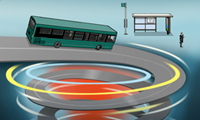
- Journey times on the rise in Glasgow, Oxford, Gloucestershire and the West Midlands
- Updated analysis of local networks Greener Journeys reveals national congestion crisis
Buses are under threat from a growing congestion crisis on Britain’s roads as journey times rise and passengers are forced to seek alternative modes of transport, a new analysis of local networks reveals.
Services in Glasgow, Oxford, Gloucestershire and the West Midlands are all suffering due to lower traffic speeds caused by rising car numbers, with some experiencing a knock-on impact in usage.
The new findings are included in an updated report on traffic congestion and its impact on bus services across the UK commissioned by Greener Journeys, the sustainable transport group, which will be launched in Westminster today.
The first part of the study, The Impact of Congestion on Bus Passengers, by Professor David Begg, was launched in June. It found that online shopping deliveries and the rise of Uber have contributed to a growing congestion crisis.
In the updated study, new research from across the UK reveals that:
- Bus journey times in the West Midlands have increased by 8% over the past seven years;
- Passenger numbers in Glasgow have fallen by an “alarming” 22% in a decade, equal to 49 million fewer passenger journeys;
- Bus speeds have fallen below 10mph in Oxford, which has one of the nation’s highest levels of bus usage; and
- Journey times on some routes in Gloucestershire have risen by 90% in the past 25 years.
In contrast, Prof Begg found that effective bus priority measures in Dublin have helped the city limit the devastating impact of congestion, with average bus speeds falling by just 0.4% last year, compared with the national UK average of 1%.
The report also warns that traffic on the roads is expected to grow by up to 55% by 2040 across the UK, and that if journey times continue to decline at their current rate, bus passenger numbers will drop by between 10% and 14% every 10 years, putting the future of the bus sector under threat.
Prof David Begg, Visiting Professor at Plymouth University and former chairman of the Government’s Commission for Integrated Transport, who authored the report, said:
“Traffic congestion is a disease which, left unchecked will destroy the bus sector. This is a dire and sensational prediction, but the evidence uncovered in this research leads to no other conclusion. Urgent action is required from industry, local government and Whitehall to reduce people’s reliance on cars and encourage more sustainable modes of transport.”
Claire Haigh, Chief Executive of Greener Journeys, said:
“This report underlines the shocking growth of congestion and its enormous impact on bus users in particular. Measures such as contactless payments and effective bus priority measures are essential in order to ease congestion and encourage greater bus patronage.
“Buses make such a significant contribution to our economy and local communities and rising congestion levels pose a direct threat to services. We must act now to ensure that increasing traffic levels do not impact upon the viability of bus travel.”
The report says that official targets for average bus speeds and the national introduction of contactless payments by 2019, three years earlier than planned, could help to ease congestion.
Other measures to be considered include charging van drivers making deliveries during peak hours; introducing more road schemes such as bus lanes; and encouraging bus companies to provide more up-to-date travel information for passengers, says the report.
Buses carry more commuters than all other forms of public transport combined and help to generate £64bn per year for local economies, while helping vulnerable people across the country stay connected with their communities.
About Greener Journeys.png)
Greener Journeys is a campaign dedicated to encouraging people to make more sustainable travel choices. We aim to reduce CO2 emissions from transport by encouraging people to switch some of their car journeys to bus or coach instead. Switching from car to bus for just one journey a month would mean one billion fewer car journeys on our roads and would save two million tonnes of CO2 every year.




Comments
There are no comments yet for this item
Join the discussion